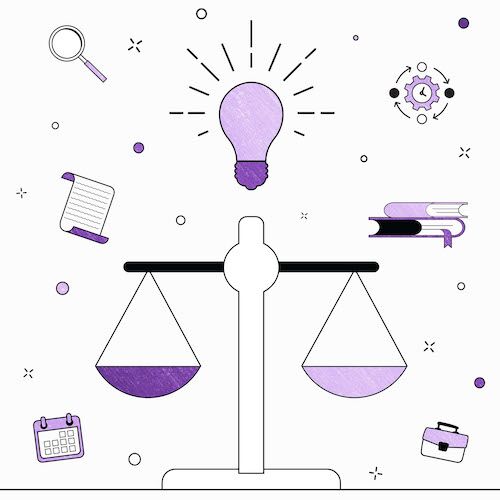Discrimination in the workplace can take many different forms. You may be treated unfairly because of your gender, race, age, or religion. You might not get hired because you have a disability or are a member of the LGBTQ+ community. No matter what form it takes, discrimination is never acceptable. In this chapter, we’ll highlight 13 types of workplace discrimination and what you can do if you have been mistreated.
It’s important to note that the following information isn’t to be construed as legal advice. You should consult an employment lawyer if you have any questions regarding the subject.
1. Color and race discrimination
This refers to the unfair treatment of an employee based on their skin color or race. An employer may use offensive language, deny an employee a promotion or segregate them from other employees—all because of race.
The Civil Rights Act of 1964 makes it illegal to discriminate against anyone on the basis of their race, color, religion, or national origin. If you have experienced color or race discrimination at work, you should first try to resolve the issue internally by speaking to your supervisor or human resources department. If that doesn’t result in a satisfactory outcome, you can file a charge with the Equal Employment Opportunity Commission (EEOC).
2. Age discrimination
Age discrimination occurs when an employee is treated unfairly because of their age. This can happen when an employer denies a subordinate a promotion because they are “too old,” or forces an employee to retire for the same reason.
Age discrimination is illegal under the Age Discrimination in Employment Act (ADEA). This law protects workers who are 40 or older from discrimination, based on their age.
If you think you have been the victim of age discrimination, you should contact an attorney who specializes in employment law. They will be able to advise you on whether you have a case, and, if so, how to proceed.
3. Gender discrimination
This happens when an employee faces discrimination based on their gender. Examples: an employer pays a woman less than a man for doing the same job, denies someone a promotion because they are “too feminine,” or segregates employees by gender.
Gender discrimination is illegal under Title VII of the Civil Rights Act of 1964. This law makes it illegal to discriminate against someone based on their sex, including pregnancy and childbirth (this will be discussed further below).
If you’ve been discriminated against on the basis of gender, try to resolve the issue internally first. If that doesn’t result in a satisfactory outcome, you can file a charge with the EEOC.
4. Disability discrimination
This refers to the unfair treatment an employee may receive because they have a disability. For example, an employee with a disability may be denied a promotion because their employer believes they cannot perform their job duties. Or an employer may refuse to make reasonable accommodations for an employee’s disability, such as providing a wheelchair-accessible workspace.
The Americans with Disabilities Act (ADA) makes it illegal to discriminate against someone on the basis of their disability. Let an employment lawyer help you file a claim and force your employer to follow the law.
5. Pregnancy discrimination
Pregnancy discrimination involves the unfair treatment of an employee because they are pregnant or have recently given birth. This can happen when an employer refuses to hire a pregnant woman, denies her a promotion, or forces her to take leave.
Pregnancy discrimination is illegal under the Pregnancy Discrimination Act (PDA). This law makes it illegal to discriminate against someone on the basis of their pregnancy or childbirth. If you are filing a claim based on pregnancy discrimination, make sure to hire an employment law attorney to help gather the evidence you need to support your claim.
6. Parental status discrimination
Parental status discrimination may seem obscure, but it’s still a viable issue. Parental status discrimination is when an employee is treated unfairly because they have children or are expecting a child. Example: a working mother may be passed over for a promotion in favor of a less-qualified man without children. This prejudice is based on the assumption that parents aren’t able to succeed in high-pressure jobs.
Parental status discrimination is illegal under Title VII of the Civil Rights Act of 1964. This law makes it illegal to discriminate against someone based on their sex, including pregnancy and childbirth (as discussed above). Hiring an employment rights attorney can help you file a claim on the basis of Title VII of the Civil Rights Act of 1964.
7. Sexual orientation discrimination
Sexual orientation discrimination happens when an employee is treated unfairly because they are lesbian, gay, bisexual, transsexual, or any other member of the LGBTQ+ community.
Example: an employee receives abusive insults from their colleagues because they are gay. If the employer refuses to take action, the employee can file a claim.
There are a few laws that protect employees from sexual orientation discrimination, including Title VII of the Civil Rights Act of 1964 and the Equal Employment Opportunity Act (EEOA).
The Civil Rights Act of 1964 is a federal law that makes it illegal to discriminate against someone on the basis of their sex, race, color, religion, or national origin. This law also applies to sexual orientation discrimination.
The EEOA is another federal law that makes it illegal to discriminate against someone on the basis of their sex. This law applies to sexual orientation discrimination, as well.
8. Religious discrimination
Here, an employee is the victim of discriminatory treatment because of their religion. Examples: derogatory comments, exclusionary behavior, being passed over for promotion. Religious discrimination is illegal under Title VII of the Civil Rights Act of 1964.
9. National origin discrimination
National origin discrimination is simply prejudice against someone who isn’t from the United States. Example: an employee or independent contractor from Mexico is called insulting names by colleagues or supervisors. A prospective hire is passed over because their boss wanted to give the job to a more “American” candidate.
This type of discrimination is illegal under Title VII of the Civil Rights Act of 1964. This law makes it illegal to discriminate against someone on the basis of their sex, race, color, religion, or national origin.
If you believe that you have been a victim of national origin discrimination, you should contact an experienced employment law attorney who can help you file a claim.
10. Genetic information discrimination
This may sound like an unusual form of prejudice—but the results are similar to everything we’ve listed above. An employer refuses to hire someone because they have a family history of cancer. A prospective employee does not get due consideration because she has the gene for Huntington’s disease. Genetic information discrimination happens—and is illegal under the Genetic Information Nondiscrimination Act (GINA). An employee can file a claim if they’ve felt wronged by genetic information discrimination and their employer refuses to take corrective measures.
11. Compensation discrimination
Compensation discrimination occurs when an employer pays one employee less than another, even though they both have the same job and job qualifications. This can happen because of an individual’s sex, race, color, religion, or national origin.
This type of discrimination is illegal under Title VII of the Civil Rights Act of 1964.
12. Harassment
Harassment in the workplace refers to any type of behavior that creates a hostile work environment and can be based on an individual’s sex, race, color, religion, national origin, age, or disability.
Examples: negative comments about lifestyle choices, offensive jokes, and unwelcome physical contact. Any form of harassment is a crime. If you have been the victim of harassment at work, you should report the behavior to your employer as soon as possible. Your employer is required by law to investigate the situation and take corrective measures if necessary.
13. Retaliation
Retaliation is when an employer takes adverse action against an employee because they have reported discrimination, harassment, or some other rights infringement. Examples: demotion, termination, and reduction in hours.
Retaliation is illegal under federal law, and employees who have been retaliated against can file a claim. It’s important to note that employers can’t retaliate against employees for filing a claim. However, the employee must win their case for the employer to be held liable.
What to do if you experience discrimination by your employer—or a potential employer
If you have experienced any of the forms of workplace discrimination listed above, here are the 3 steps you need to take.
1. Document the experience
You need some form of documentation or evidence to back up your claim. This can be emails, text messages, performance reviews—anything that shows discrimination took place.
If you don’t have any physical evidence, make sure to take detailed notes about what happened, when it happened, and who was involved.
2. Contact the EEOC or your state’s fair employment practices agency
The EEOC is the federal agency responsible for investigating claims of workplace discrimination. You can contact the EEOC to file a charge against your employer.
Each state has its own fair employment practices agency. Contact this agency if you live in a state that doesn’t have an EEOC office. These agencies are responsible for investigating discrimination claims at the state level.
3. Contact a lawyer
If you’ve been the victim of discrimination, consider contacting an experienced employment lawyer. They can help you understand your rights and will be able to guide you through the process of filing a claim.
Don’t delay in filing a claim
No one deserves to be treated unfairly at work. If you have experienced any type of discrimination in the workplace, don’t hesitate to take action.
Hiring an employment rights attorney through one of LegalShield’s personal legal plans, is one of the best steps you can take to ensure you are protected.
Pre-Paid Legal Services, Inc. (“PPLSI”) provides access to legal services offered by a network of provider law firms to PPLSI members through membership-based participation. Neither PPLSI nor its officers, employees or sales associates directly or indirectly provide legal services, representation, or advice. The information available in this blog is meant to provide general information and is not intended to provide legal advice, render an opinion, or provide any specific recommendations. The blog post is not a substitute for competent legal counsel from a licensed professional lawyer in the state or province where your legal issues exist, and the reader is strongly encouraged to seek legal counsel for your specific legal matter. Information contained in the blog may be provided by authors who could be a third-party paid contributor. All information by authors is accepted in good faith, however, PPLSI makes no representation or warranty of any kind, express or implied, regarding the accuracy, adequacy, validity, reliability, availability, or completeness of such information.





